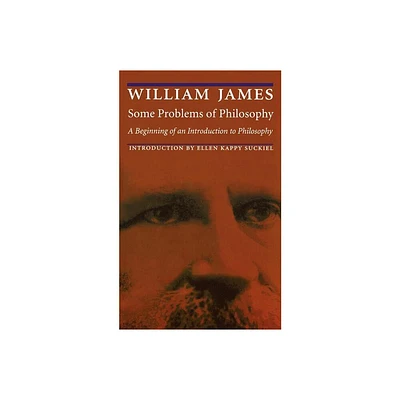Home
Pragmatism, a new name for some old ways of thinking; popular lectures on philosophy (1907). By: William James: William James (January 11, 1842 - August 26, 1910) was an American philosopher and psychologist who was also trained as a physician.
Loading Inventory...
Barnes and Noble
Pragmatism, a new name for some old ways of thinking; popular lectures on philosophy (1907). By: William James: William James (January 11, 1842 - August 26, 1910) was an American philosopher and psychologist who was also trained as a physician.
Current price: $8.65


Barnes and Noble
Pragmatism, a new name for some old ways of thinking; popular lectures on philosophy (1907). By: William James: William James (January 11, 1842 - August 26, 1910) was an American philosopher and psychologist who was also trained as a physician.
Current price: $8.65
Loading Inventory...
Size: OS
*Product Information may vary - to confirm product availability, pricing, and additional information please contact Barnes and Noble
William James (January 11, 1842 - August 26, 1910) was an American philosopher and psychologist who was also trained as a physician. The first educator to offer a psychology course in the United States, James was one of the leading thinkers of the late nineteenth century and is believed by many to be one of the most influential philosophers the United States has ever produced, while others have labeled him the "Father of American psychology". Along with Charles Sanders Peirce and John Dewey, James is considered to be one of the major figures associated with the philosophical school known as pragmatism, and is also cited as one of the founders of functional psychology. A Review of General Psychology analysis, published in 2002, ranked James as the 14th most eminent psychologist of the 20th century. He also developed the philosophical perspective known as radical empiricism. James' work has influenced intellectuals such as Émile Durkheim, W. E. B. Du Bois, Edmund Husserl, Bertrand Russell, Ludwig Wittgenstein, Hilary Putnam, and Richard Rorty, and has even influenced Presidents, such as Jimmy Carter. Born into a wealthy family, James was the son of the Swedenborgian theologian Henry James Sr. and the brother of both the prominent novelist Henry James, and the diarist Alice James. James wrote widely on many topics, including epistemology, education, metaphysics, psychology, religion, and mysticism. Among his most influential books are The Principles of Psychology, which was a groundbreaking text in the field of psychology, Essays in Radical Empiricism, an important text in philosophy, and The Varieties of Religious Experience, which investigated different forms of religious experience, which also included the then theories on mind-cure. Philosophy of religion James did important work in philosophy of religion. In his Gifford Lectures at the University of Edinburgh he provided a wide-ranging account of The Varieties of Religious Experience (1902) and interpreted them according to his pragmatic leanings. Some of the important claims he makes in this regard: Religious genius (experience) should be the primary topic in the study of religion, rather than religious institutions-since institutions are merely the social descendant of genius. The intense, even pathological varieties of experience (religious or otherwise) should be sought by psychologists, because they represent the closest thing to a microscope of the mind-that is, they show us in drastically enlarged form the normal processes of things. In order to usefully interpret the realm of common, shared experience and history, we must each make certain "over-beliefs" in things which, while they cannot be proven on the basis of experience, help us to live fuller and better lives. Religious Mysticism is only one half of mysticism, the other half is composed of the insane and both of these are co-located in the 'great subliminal or transmarginal region'. James investigated mystical experiences throughout his life, leading him to experiment with chloral hydrate (1870), amyl nitrite (1875), nitrous oxide (1882), and peyote (1896). James claimed that it was only when he was under the influence of nitrous oxide that he was able to understand Hegel. He concluded that while the revelations of the mystic hold true, they hold true only for the mystic; for others, they are certainly ideas to be considered, but can hold no claim to truth without personal experience of such. American Philosophy: An Encyclopedia classes him as one of several figures who "took a more pantheist or pandeist approach by rejecting views of God as separate from the world."











